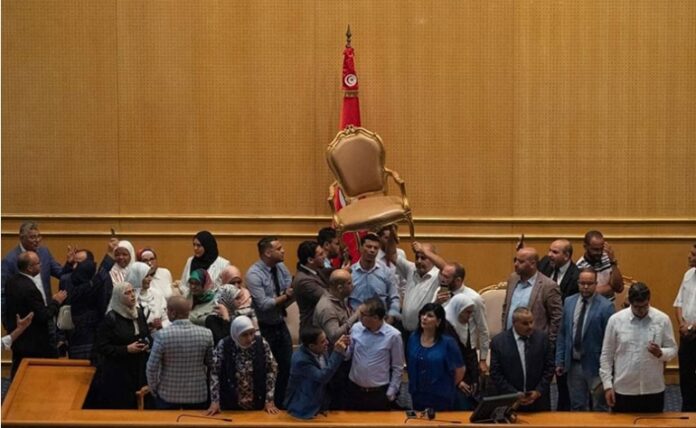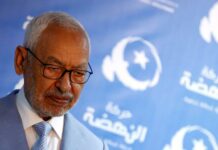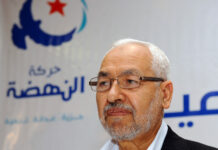The entitlement to change the political system and the effectiveness of this step creates a controversy in Tunisia , after nearly a decade of choosing an amended parliamentary government during which Tunisia experienced changes, political crises and a power struggle between the legislative and executive authorities on the one hand and the two heads of the executive authority on the other hand.
Recall that, this came after a statement attributed to the advisor to the President of the Republic, Walid Hajjam, in which he said, “There is a tendency to amend the political system in Tunisia, perhaps through a referendum, and that the constitution is supposed to be suspended and a temporary system of authorities is issued.”
Objective evaluation first
In this context, constitutional law professor Abderrazak Mokhtar told “JDD Tunisie”, on September 11, 2021, that Article 80 of the Constitution does not allow the suspension, which may call into question all the measures taken by the President of the Republic, Kais Saied, and the “constitutional narrative” that He based his discourse on it and based it on his assertion that he respects the texts and laws.
He added that the systems have developed according to the the parliamentary experience in Britain and the presidential one in the United States of America, but “the migration of these systems” out of their contexts has produced adaptation or distortion, considering that they are not a textual transfer of constitutions from one place to another, but rather are societal spaces, according to him.
He explained that the parliamentary experience is successful as long as the conditions are met.
He added that Tunisia adopted this model without established parties, in order to ensure the production of deliberation and clear governance programs, in addition to merging the mechanisms of the parliamentary and presidential systems due to justified and unjustified fears of a return to the tyranny of the individual.
In the same context, Mokhtar indicated that what is currently required is distance, objectivity, and lack of emotion through evaluating the previous experience, even though its institutions have not been completed.
He, even, pointed out that it is necessary to be careful and not rely on the circumstance or the President of the Republic for analysis and evaluation because the basic condition is the societal condition, as he put it.
Mutual Disable
Professor of constitutional law, Salsabil Klibi, called to avoid a return to the presidential system because of the possibility of disruption between the authorities is possible, given that if the president does not have a parliamentary majority that supports him, he may be subject to obstruction by enacting laws that completely contradict the policy of his choice.
She noted that in this model, The President of the Republic does not have the right to a legislative initiative.
The differential formula is not possible
In the same context , the constitutional law researcher and founding deputy, Rabeh Khraifi, told “JDD Tunisie “today, Saturday, September 11, 2021, that it is not possible to be certain that this system is better than others, because each of them has its advantages and disadvantages.
Khraifi said that the best political systems are those that fit the mental and political composition of the people, pointing out that the amended parliamentary system is not ready to rule because of the elite at times and the sociological composition of Tunisians that do not see power “only in the hands of a single president,” in addition to some articles which are “inflexible”.

Khraifi added that the president’s idea should be accompanied by a set of mechanisms to avoid delinquency towards tyranny.
According to the same source, “among these mechanisms a strong parliament that can only be entered by qualified and honest people through changing the electoral law and reducing the number of representatives should exist , as well as ensuring the independence of the judiciary and the establishment of the Constitutional Court.
Add to that , the president has a strong parliamentary bloc that helps him pass his projects without hindrance.”
Our interlocutor explained that it is not possible to be certain that choosing the President of the Republic to return to the presidential system is a wrong assessment, given that he did not publish an official document subject to discussion and criticism and that everything issued by the institution does not go beyond statements that can be interpreted, according to him.
“Tunisian dish”
The President of the Republic, Kais Saied, stressed on more than one occasion that he will not go back, in reference to his intention to move forward with making radical changes to the political system, and thus, in keeping with his previous positions for his candidacy for elections, he described the system that emerged from the new constitution in a 2014 statement, as “The Tunisian dish,” meaning that it is a hybrid and is difficult to classify.
Saied said that the political parties did not work to establish serious balances as much as they tried to seize certain powers according to their political visions, and these attempts ended by adding some powers to the President of the Republic so that the real center of gravity remains in the hands of the government.
Saied added that this system can be considered “dual,” but not in the traditional sense, given that the reality of power remains in the hands of Parliament and the head of government, which makes it a dual system closer to the parliamentary system, or it is essentially a parliamentary system that has been subjected to some amendments that came as a result of political conflicts in the Constituent Assembly.











